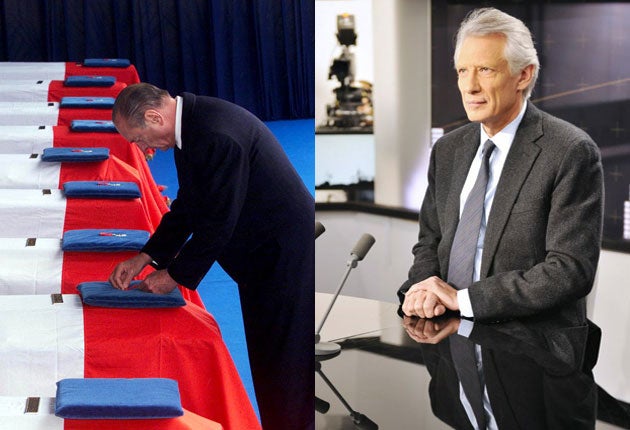Villepin backs 'Karachigate' claims against Sarkozy

A full-blown state scandal, involving President Nicolas Sarkozy and other senior figures, threatens to explode this week over "Karachigate", the allegation that political corruption and revenge-taking in France led to the murder of 11 French submarine engineers in Pakistan in 2002.
The former prime minister, Dominique de Villepin, a visceral enemy of President Sarkozy, has sprinkled new fuel on what already threatens to become the most damaging French political scandal for decades.
On the French television news, Mr Villepin spoke of his "very strong suspicions" that kickbacks were paid to "political and non-political personalities" in France on the €800m sale of three Agosta 90B submarines to Pakistan in 1994. Mr Villepin confirmed that, as President Jacques Chirac's chief of staff, he had been personally involved in cancelling the Pakistani payments "to help clean up public life" in 1995-96. He offered to give evidence to French magistrates, who are investigating allegations that the cancellation led eventually to a bomb attack on a bus in Karachi in May 2002 in which 11 French engineers and four Pakistanis died. The engineers were to supervise the assembly of the submarines.
Initially, the bombing, just eight months after the 9/11 attacks in New York, was blamed on al-Qaida. For the past two years, French magistrates have been investigating claims that the bombing was connected to a web of financial chicanery and political manoeuvring, spun by the fraternal hatreds on the centre-right of French politics.
They suspect that €80m in "commissions" were paid – legally – to senior Pakistani figures in 1994 and that part was "kicked back" – illegally – to the presidential campaign fund of the then French Prime Minister, Edouard Balladur. The official spokesman for Mr Balladur's, ultimately failed, 1995 presidential campaign was Nicolas Sarkozy, then the budget minister.
When Jacques Chirac became President in May 1995, it is alleged that he cancelled what was left of the Pakistani "commissions" to punish his old friend Mr Balladur for running against him. As a result, the investigating magistrates believe, unknown figures in the Pakistani establishment fomented the Karachi bombing to "punish" Mr Chirac, after he was re-elected in May 2002.
Although Mr Villepin made no specific allegations against Mr Sarkozy, his televised comments were interpreted by the French media, and by the Elysée Palace, as a destructive new offensive in a brutal political war which has raged between the two former colleagues for the past 16 years. The Elysée Palace issued a statement denouncing Mr Villepin's "insinuations", accusing him of exploiting the "tragedy" to make "mendacious allegations". On Saturday, President Sarkozy made only his second public comment on the "Karachigate" scandal. "We are in a world of crazy people here," he said. "Not one of you really believes that I was involved in organising commissions and retro-commissions [kickbacks] on submarines for Pakistan. And yet this incredible stuff gets on the television."
Mr Sarkozy said that, as budget minister, he had "no knowledge, either near or far" of the details of the Agosta submarine deal. But this contradicts a report sent to French investigating magistrates in June this year by Luxembourg police. They said Mr Sarkozy had been involved in 1994 in the creation in the Duchy of a company called Heine, which handled large payments connected with the submarine sale.
President Sarkozy also offered to ensure that any documents related to the affair were made available to investigators and not covered by "defence secrecy". But families of the 11 Cherbourg-based engineers attacked him. Magali Drouet, whose father, Claude was the leader of the group, said he had "as good as confessed" that some important documents had been concealed. Ms Drouet is the co-author of a book on the struggle for justice by the "Karachi families". "You can smell the panic at the highest levels of the state," she said. "It is now clear that our fathers did not die 'for France' but 'because of France'."
Join our commenting forum
Join thought-provoking conversations, follow other Independent readers and see their replies
Comments
Bookmark popover
Removed from bookmarks